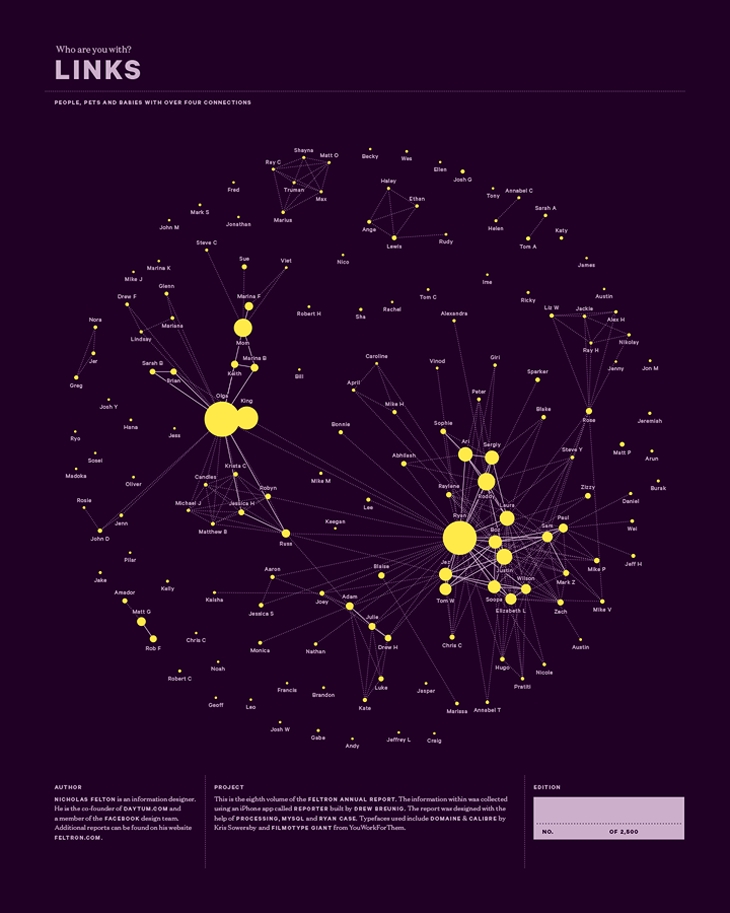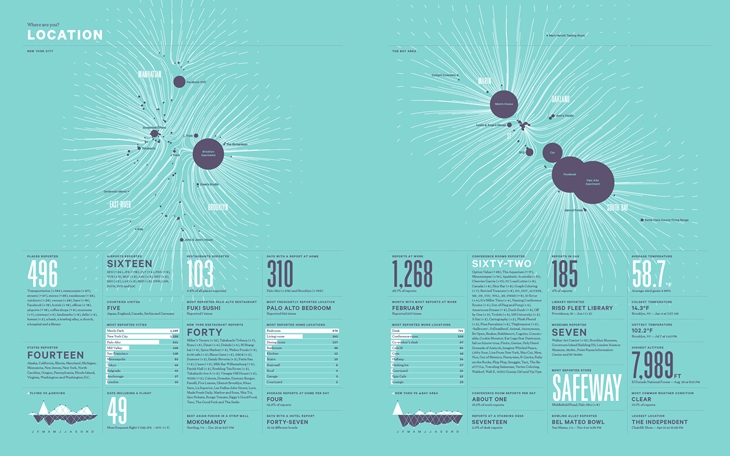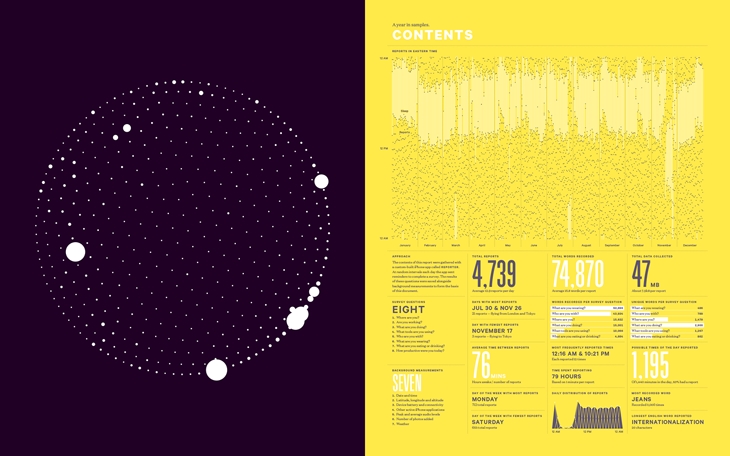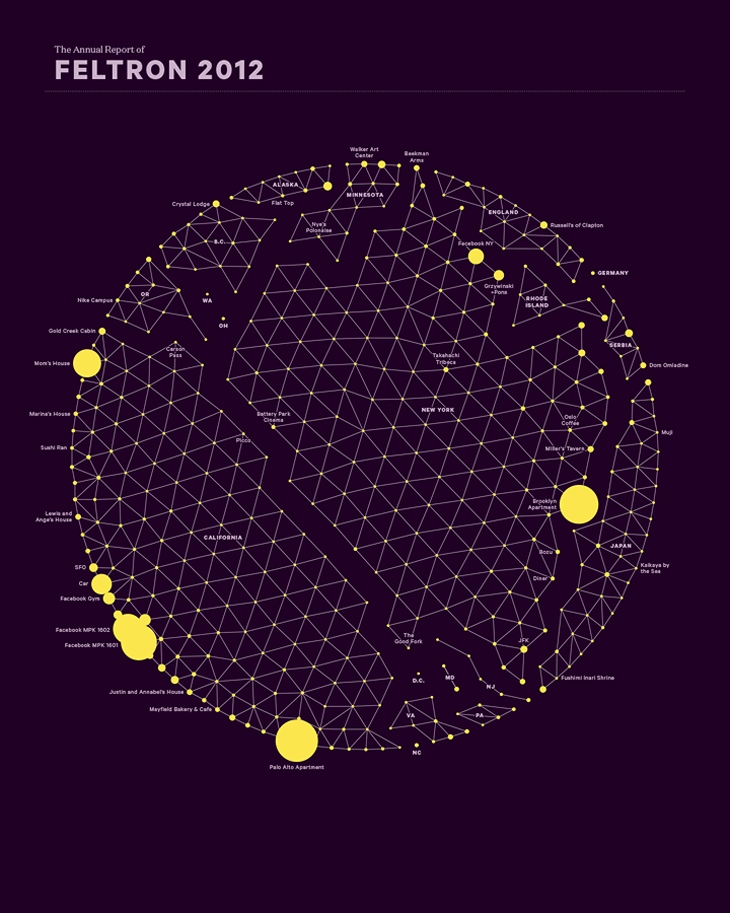How did the Feltron Annual Reports get started?
In 2004, I designed a year-end report called “Best of 04” that included a few numerical details about the year, like the number of postcards sent and airmiles traveled. The following year (2005), I created the first Annual Report out of information drawn from my memory, calendar, photos and last.fm data. This segmented the year into sections like Travel, Photography, Music and Books which I thought would be primarily interesting to only friends and family. Surprisingly, the report was as popular among people who had never met me as with those who knew me intimately and a result, I have dedicated increasing amounts of time to documenting and charting the passage of each year.
What is the process of creating an Annual Report?
The first and most difficult step is to keep meticulous records of the year. On top of my own records, I rely on services like Last.fm, Netflix and Flickr to keep records of my music-listening, movie-renting and photo activities. For my offline activities, I make daily recordings in iCal which are later poured into spreadsheets to enable counting and comparisons within the data. I collect inspiration and make sketches throughout the year, but never begin the design until all the data has been collected. On January 2nd I start playing with typefaces I`ve found throughout the year and experiment with the maps and content, but I allow the stories to unfold and develop the format of the book. After about 2 or 3 weeks of condensed work I will have the design finalized and posted online. Finally, I will settle on PMS colors, source paper stock and get printing estimates before sending my mechanicals off to be printed.
How has this project (and the burden of recording all this behavior) changed how you live?
The project has always been structured to record my natural behaviors, rather than influence them, which is why I refrain from tallying the results until the end of the year. Of course, recording other metrics with Daytum.com starts to create feedback loops. If you can see the miles you walk daily starting to fall, then there’s an impetus to walk more. Thankfully it only takes a few minutes a day of recording to create an extremely detailed data set of the year, and for the most part, I don’t let it burden my activities.
Do you ever fudge the numbers?
Nope. I don`t guestimate because I have an honest curiosity about the outcome. Once my confidence in a number slips, its inaccuracy bothers me and I won’t publish it. The numbers I use have to be rooted in a strong methodology, and evaluated in a repeatable manner.
Has logging and analyzing your life made you change your habits?
To a certain extent. Keeping track of my running helps keep me connected to that activity and gives me goals and a way to measure my progress. In other areas, it hasn’t had as much of an impact. When I’ve tried to keep track of my reading in an effort to increase my consumption of books, I found that it didn’t have an impact. How much I read is determined by how often I find books that engage me. Ultimately, my life tracking is more about recording and preserving my activities than in changing my behavior.
Do you ever find it a bit scary that complete strangers know so much about you?
Perhaps it should bother me more, but it`s curated knowledge and they’ve only learned what I’d like them to know about me. I’ve offered a lot of insight into my interests and habits and some nice factoids, but I don`t believe that it provides complete sense of who I am, or what I’m like. In fact people that know my work well have the tendency to tell me that I’m not at all like what they expected. So while a reader may have an intimate knowledge of my favorite band, the broader personal strokes of my life are missing.
How do you decide which data to gather over the course of the year?
I tend to discover things in the course of the year that I wish I had been tracking from the beginning, and they are added to next year’s list of items to-track. I also tend to think up fun or interesting ways to manipulate the data I am collecting throughout the course of the year. As the project has evolved, I have tried find new vantage-points on the year. 2008 was focused on distance, 2009 was concerned with the recollections of the people I spent time with and 2010 is centered on time.
Are there things you won`t publish in your reports?
I avoid bodily functions and find most monetary reporting distasteful.
What makes self-initiated projects like these worthwhile?
The beauty of the project for me is the virtuous cycle it creates between the personal and professional. The more Annual Reports I create, the more work of this type comes my way, and the more data visualization work I create, the better my Annual Reports become.
And what advice would you have for anyone considering their own project?
I made numerous personal projects before I found one that resonated with an audience. I think you have to keep plugging away until you find something that sticks. A small passionate audience can quickly swell into something larger and more significant once you have a toehold.
 NICHOLAS FELTON ANNUAL REPORT 2012
NICHOLAS FELTON ANNUAL REPORT 2012 NICHOLAS FELTON ANNUAL REPORT 2012
NICHOLAS FELTON ANNUAL REPORT 2012 NICHOLAS FELTON ANNUAL REPORT 2012
NICHOLAS FELTON ANNUAL REPORT 2012 NICHOLAS FELTON ANNUAL REPORT 2012
NICHOLAS FELTON ANNUAL REPORT 2012Eyeo2012 – Nicholas Felton from Eyeo Festival on Vimeo.
Eyeo2012 – Nicholas Felton
READ ALSO: FIXPERTS